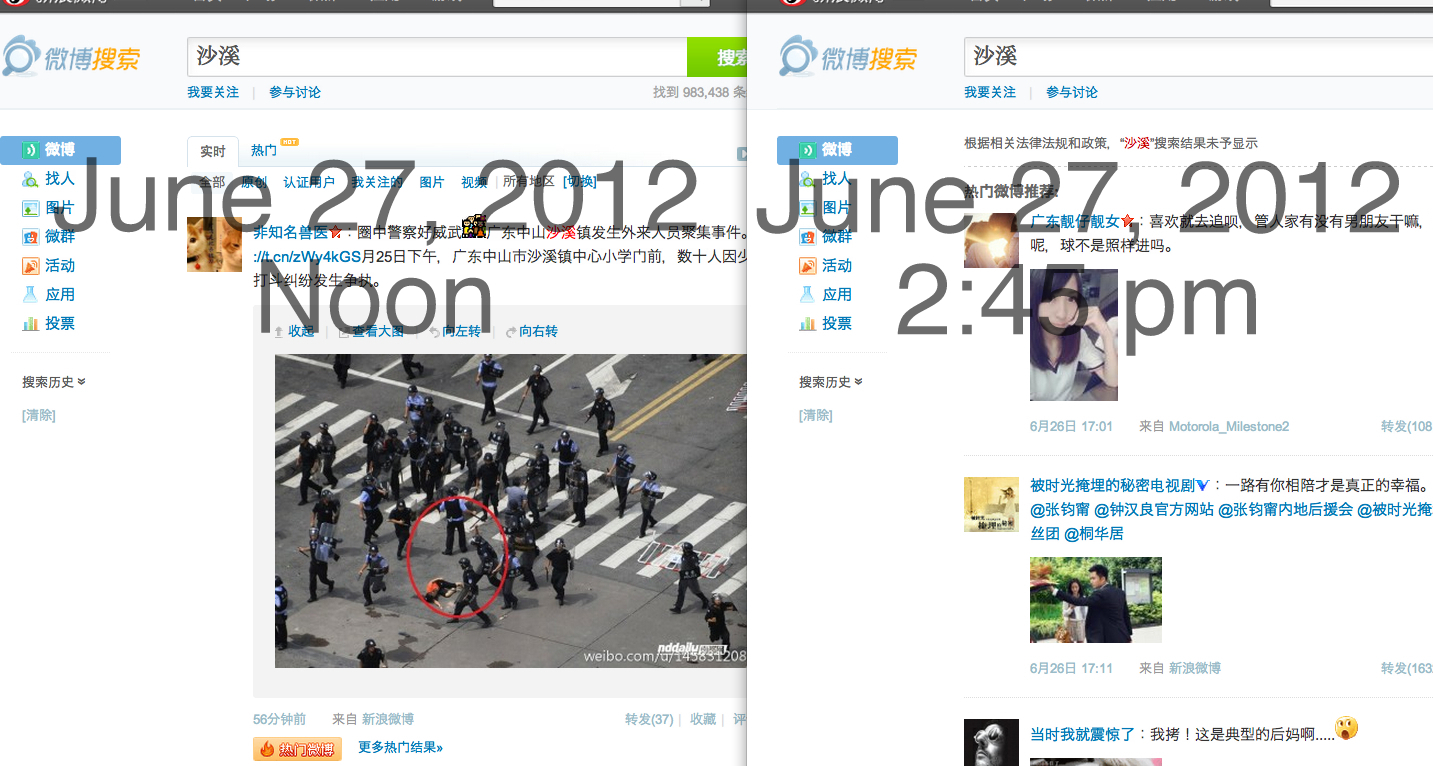These screenshots show that the New York Times Sina Weibo was launched on June 27, 2012 at http://www.weibo.com/nytchinese. It was deleted the following day. It was re-launched on June 28, and was once again deleted the following day.

Saturday, June 30, 2012
Friday, June 29, 2012
Shaxi and Zuotan: More Protests, More Cities Disappear From Sina Weibo
On June 27, 2012, the state-sponsored Global Times reported:

On June 28, 2012, the state-sponsored China Daily reported:

Hundreds of residents in Shaxi, in South China's Guangdong Province, yesterday confronted a barrage of police officers during demonstrations outside local government offices.The screenshots were taken on June 27, and show that between noon and 2:45, Sina Weibo began censoring searches for "Shaxi." (沙溪)
Police from Shaxi township, in the city of Zhongshan, confirmed the clash in a statement posted on their official Weibo account last night, saying the gathering began on Monday afternoon and lasted until early yesterday morning when the crowd was dispersed by police.
According to the statement, the protest was sparked on Monday afternoon, by the beating of a local elementary school student by a teenager from Chongqing in front of the school, before local security officers from Longshan village tied the teenager up and injured his face while trying to settle the fight.
On June 28, 2012, the state-sponsored China Daily reported:
Also on [June 25], officials of Foshan's Zuotan village were interrupted in a meeting by a group of villagers who abducted them and put them in a minibus. The kidnappers allowed no one to send food and water to the officials, who included the head of the village and his deputy.The screenshot shows that a search for "Zuotan" (左滩) on Sina Weibo on June 27 returned no results, just a notice saying "In accordance with relevant laws, regulations, and policies, search results for 'Zuotan' have not been displayed." (根据相关法律法规和政策,“左滩”搜索结果未予显示。).
The two officials were held in the minibus for more than nine hours and were rescued by police officers the next morning.
The incident resulted in the injury of two villagers and damage to a police car. The police said they are not certain why the two officials were kidnapped.
Wednesday, June 27, 2012
Chinese Professor Calls for Less Censorship for Academia
On June 26, 2012, the state-sponsored Global Times published an editorial by Wu Chuke (吴楚克), a professor at the Minzu University of China (中央民族大学), entitled "Let There Be Fewer 'Sensitive Points' for Academic Research" (让学术研究少些“敏感点). Some excerpts:
These days the amount of freedom within the Chinese Academy of Social Sciences has significantly progressed, and speech and publishing has relaxed a great deal. But we still often run into articles or content that is "too sensitive" and cannot be published, or situations where an article can only be published after the "sensitive content" has been deleted. To a certain degree, this makes it difficult to publicize true public opinion, and makes it impossible to bring the common wisdom to bear on major social issues, to the point where it creates opportunities for foreign media to make ad hoc judgments about the popular will in China.
. . . .
In fact, the particular government agency employees and publishing companies often cannot correctly grasp "what is sensitive and what is not sensitive," and "when is it sensitive and when it is not sensitive." This is in part because there volume of information is too great, and develops too quickly, such that any one person is unable to understand the specific circumstances. For example, this writer went to Taiwan to present a paper at a conference, but the relevant personnel believed it was too sensitive, when in fact the paper had already been published in a newspaper. They just didn't have time to read all the newspapers.
It is also in part because we hope to maintain a "Chinese-style unanimity between the top and the bottom" in front of outsiders. And some media refuse to publish media debates "for fear of hassles" citing grounds of "excessive sensitivity," lest foreign media, embassies, and other groups constantly create "hassles" for our publishers.
. . . .
Over the long run, this will lead people to blindly believe reports from overseas media about domestic events. In addition, all of the enormous energy spent on "unanimity between top and bottom" will be overwhelmed by a few "negative" news stories, and people will be more inclined to believe information from non-mainstream sources.
中国社会科学研究的自由度如今有了很大进展,舆论和出版也宽松很多。但我们还是常常会碰到文章或者内容“太敏感”不能发表,或者需要把“敏感内容”删除才能刊发的情况。这在某种程度上让真正的民意难以公开,也让公众智慧无法作用于重大社会问题上,反而还给国外媒体随意判断中国民意提供借口。
. . . .
实际上,具体政府管理部门人员和出版单位往往并不能准确把握“什么敏感和不敏感”、“什么时间敏感什么时间不敏感”。一是因为信息量太大、发展太快,一个人根本无法了解具体情况,比如笔者去台湾开会提交的论文,被有关人员认为太敏感,实际上该论文在报纸已公开发表,他们并没有时间查阅所有报刊。二是我们总希望对外保持“中国式的上下一致”,或者国外媒体和大使馆等机构经常找我们出版机构的“麻烦”,一些媒体便常常因为“怕麻烦”而以“太敏感”为由拒绝公开媒体辩论。
. . . .
长此以往,一方面导致人们盲目相信外媒对国内事件的报道;另一方面花了很大力气搞“上下一致”,被几个“负面”新闻就压倒了,人们更相信来自非主流的信息。
Subscribe to:
Comments (Atom)
Translation: Sun Daluo's Court Judgment for Sharing Books and Articles
The PRC government sentenced Sun Zhiming (孙志明, who wrote under the alias Sun Daluo (孙大骆)) to one year imprisonment for the crime of "di...
-
At 8:50 pm on August 1, 2014, the following announcement appeared on the official Sina Weibo of the Wenzhou branch of China Cable (中广有线温州分...
-
1. "The Truth" From at least June 26 through July 9, searching on Sina Weibo for "The Truth" (真相) returned no results...
-
Source: http://www.zgbfly.gov.cn/zw/shownews.asp?newsid=1510 Notice Regarding Launching Special Operation to Strengthen Administration ...


